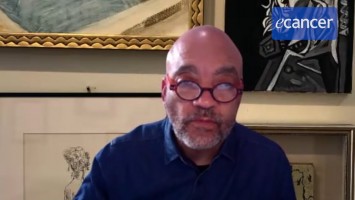ASTRO 2015
Longer duration of ADT after radiotherapy improves disease-free survival in prostate cancer
Dr Colleen Lawton - Medical College of Wisconsin, Milwaukee, USA
That trial was run in the mid-nineties and we were looking at that time to try to understand whether the addition of hormone therapy for longer periods of time or shorter periods of time was important. There were trials that were run before that, RTOG-8610 and RTOG-8531 that looked at different lengths of time, all showing a benefit to the use of hormone therapy and so the question was how much do we really need. So RTOG-9202 addressed that question.
The design of the trial is essentially locally advanced prostate cancer patients, patients who don’t have evidence of disease outside of the prostate or pelvic area but still have fairly bulky disease. Those patients were randomised, they all got radiation then they were randomised to the addition of two years of hormone therapy after the radiation. So the treatment was two months of hormone therapy for everyone, radiation and hormone therapy, and then no hormone therapy after the radiation or two years of hormone therapy.
The main results really reinforce the need for longer term hormone therapy compared to shorter term hormone therapy. The patients who got the full 28 months of hormone therapy, we cured more cancers. The most important thing that patients want to know when they come is, ‘Doctor, am I going to die of my prostate cancer?’ We can tell them honestly, with very good science, that if they get the longer term hormone therapy we can really decrease that risk.
What were the results in regard to overall survival?
Progression free survival, the most important thing is back to disease specific survival. So there was a relative risk reduction of 40% in disease specific survival, overall survival did not reach statistical significance but disease specific survival did.
What about the tolerability about using hormonal therapy for longer?
Which is a great question because hormone therapy, anti-male hormone therapy, which is the treatment that is utilised, does have toxicities to it. The good news is both for the short term hormone therapy arm and the long term hormone therapy arm there was no difference in other caused death or things that would really be traumatic for the patient. That said, there certainly are side effects to hormone therapy that need to be mitigated with exercise, diet, because weight gain, muscle mass loss, bone loss are realities of longer term hormone therapy. So really seeing a doctor, a medical oncologist, so that those things can be addressed are very important.
How may these results alter current clinical practice?
What it does is it reinforces what we thought we knew but in fact we now know for sure is that even if we follow these patients for a much longer period of time we still see a benefit. The next step is really to understand, so we really have big disparities in the length of hormone therapy and we want patients to get as short a period of hormone therapy as they need but as long as they need. So we have to find that balance. The Canadians have done a trial looking at 18 months versus 36 months and the preliminary data looks like there’s no difference there. So maybe we can shorten it to 18 months, maybe it’s a year. But what we do know is longer is better and the question is how much can we shorten it before we’re going to not get that benefit.
The take home message is for patients who have locally advanced disease, they need the longer term hormone therapy to get the best benefit when they’re treated with definitive radiation.







![Upfront [177Lu]Lu-PSMA-617 radioligand therapy prior to radical prostatectomy in men with HR PC ( Dr Renu Eapen - Peter MacCallum Cancer Centre, Melbourne, Australia )](https://cdn.ecancer.org/44737-m.jpg)
